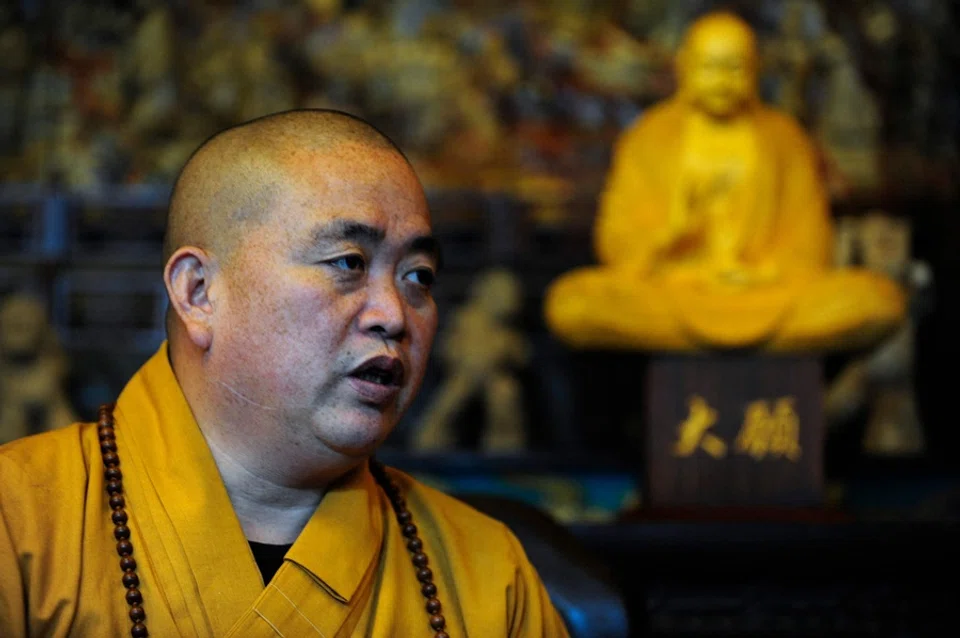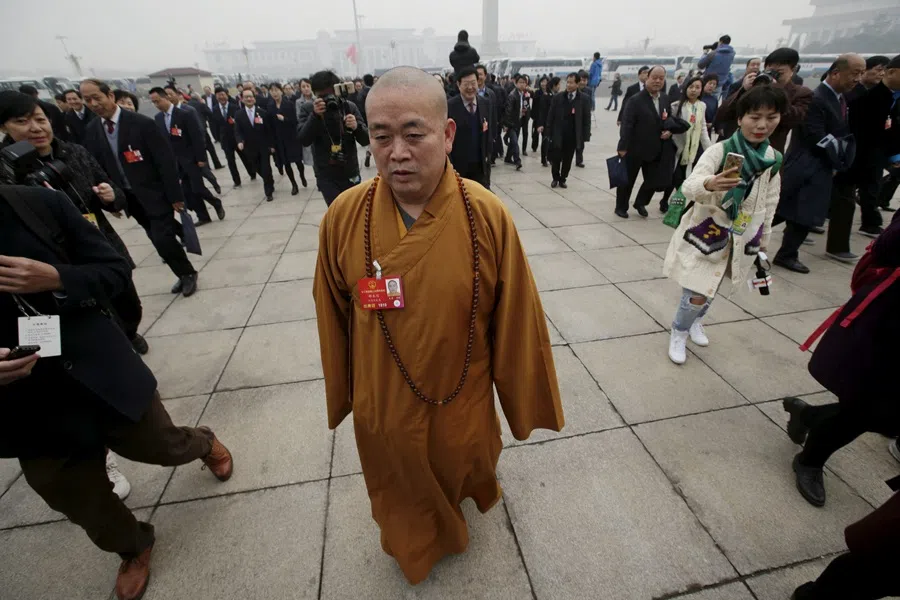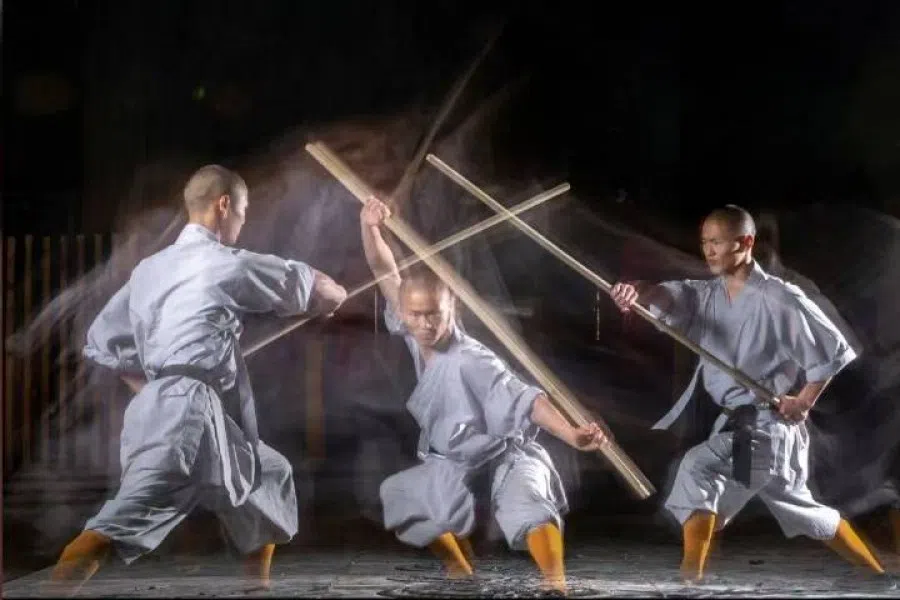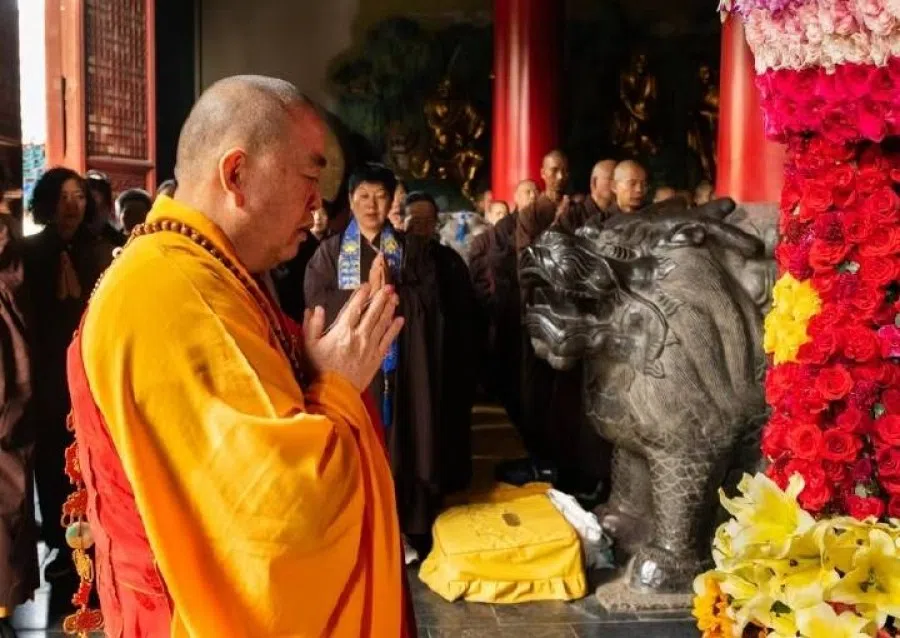Abbot Shi Yongxin of Shaolin Temple has finally fallen
After years of rumours, the scandals of Shi Yongxin, abbot of Shaolin Temple, have finally caught up to him. Lianhe Zaobao correspondent Yu Zeyuan takes a look at the Buddhist leader’s vice that has shaken the world.

Abbot Shi Yongxin of Shaolin Temple has finally fallen. On 27 July, Shaolin Temple’s management office announced that Shi is suspected of criminal offences such as embezzling and misappropriating project funds and temple assets. He is also accused of seriously violating Buddhist precepts by maintaining improper relations with several women as well as fathering illegitimate children. He is currently under joint investigation by multiple departments, and relevant updates will be disclosed to the public in a timely manner.
Possible imprisonment
Over the past decade, Shi — a controversial figure often referred to as the “internet celebrity abbot” — had been at the centre of various negative reports. On 26 July, social media platforms were the first to break the news that Shi had been taken away for investigation. Subsequently, traditional media outlets such as the Jiangnan Metropolitan News (江南都市报) confirmed through multiple sources that Shi had indeed been taken in for questioning by the authorities.
Netizens had their popcorn ready to watch the drama unfold. On 27 July, one netizen posted an alleged police report from the Kaifeng Public Security Bureau, claiming that Shi had attempted to flee to the US along with 34 others but were intercepted by the police. Although the Kaifeng Public Security Bureau was quick to refute this rumour, they confirmed that relevant investigations were underway. Later that evening, the management office of Shaolin Temple briefly outlined Shi’s alleged crimes and confirmed that a joint investigation involving several departments was in progress.
After all, the assets managed by Shi at the Shaolin Temple also formed a substantial “commercial empire”, and his fame and influence were no less than that of Zong.
Based on the management office’s statement, Shi’s alleged criminal activities that included embezzlement and misappropriation of temple assets were severe enough to result in imprisonment.
The level of public interest in Shi’s case is comparable to the recent high-profile inheritance dispute involving the children of Wahaha founder Zong Qinghou. After all, the assets managed by Shi at the Shaolin Temple also formed a substantial “commercial empire”, and his fame and influence were no less than that of Zong.
From a temple disciple to a ‘CEO’ abbot
The 60-year-old Shi, born Liu Yingcheng, had served 20 years as a representative of the National People’s Congress and is currently the abbot of Shaolin Temple, president of the Henan Provincial Buddhist Association and vice-president of the Buddhist Association of China.

Shi joined Shaolin Temple at the age of 16, becoming a disciple of Abbot Shi Xingzheng. In 1987, following the passing of the elder Shi, the 22-year-old Shi Yongxin became the director of Shaolin Temple’s management committee, overseeing the temple’s affairs. He served as the abbot of Shaolin Temple since 1999, marking 26 years in the role.
Under Shi’s leadership, Shaolin Temple grew its influence. Shi established the Shaolin Temple martial arts team, the Shaolin Red Cross Association and the Shaolin cultural research institute, and proposed the concept of “Shaolin studies”. Later, he founded modern enterprises such as the Henan Shaolin Temple Industrial Development Company, Henan Shaolin Intangible Assets Management Centre and Tiesong Technology.
Shi advocated for “the internationalisation of Chinese Buddhism”, establishing overseas cultural exchange centres in cities such as Berlin, London and Los Angeles. He has also published works including Zen Buddhism (《禅露集》), Moving Body Still Mind (《动身不动心》) and Shaolin Kung Fu (《少林功夫》).
Known for his exceptional business acumen, Shi built a stellar commercial empire that spanned multiple sectors across the globe, transforming the Shaolin Temple into a place of both spiritual significance and commercial vitality — earning it the title of “the world’s number one temple”. He established the temple as a renowned Chinese cultural intellectual property (IP), bringing in huge economic value at the same time.
The temple’s annual income is estimated at around 500 million RMB, with earnings from ticket sales, incense offerings and brand licensing.
Shi’s business empire operates primarily through corporate structures, closely binding the Shaolin IP with capital interests. For example, Shi owned 80% of Shaolin Intangible Assets Management Centre (formerly Henan Shaolin Industrial Development Co. Ltd.) before the ownership was transferred to the temple. The company’s registered capital gradually increased from 1 million RMB (US$140,000) to 100 million RMB, and its 16 external investments span multiple sectors.
According to data from Tianyancha, Shi has been associated with as many as 18 enterprises, in fields such as cultural promotion, real estate, health management and entertainment. Shaolin Temple has registered over 700 trademarks, covering items such as Shaolin Kung Fu and Shaolin vegetarian pastries. The temple’s annual income is estimated at around 500 million RMB, with earnings from ticket sales, incense offerings and brand licensing.

In 2022, Shaolin-held Tiesong Technology spent 452 million RMB to acquire land in Zhengzhou to build a commercial complex. Shaolin branches in Europe and other regions have also started offering “Zen retreat experience courses”, and there were even reports that Shaolin Temple earned tens of millions of British pounds annually.
Commercialisation to protect Shaolin culture
Shi’s prominent presence in the business world has long been a source of controversy. In 2015, a person claiming to be a former Shaolin disciple, “Shi Zhengyi”, alleged online that Shi Yongxin was a corrupt “tiger” unchecked by any authority. Shi Zhengyi accused Shi Yongxin of maintaining improper relationships with multiple women, having an illegitimate daughter, and possessing two identity cards, among other claims.
... given the limited government funding, Shaolin Temple — like other temples and Taoist monasteries — needs to rely on commercial activities to sustain itself and continue operating.
In response to criticism, Shi said that commercialisation was aimed at better protecting Shaolin culture. Data show that Shaolin Temple allocates about 30% of its annual commercial revenue to the restoration of ancient architecture (in 2010, it put 200 million RMB towards restoring the Pagoda Forest) as well as cultural heritage protection and charitable causes (such as donating 10 million RMB to Wuhan’s Covid-19 relief efforts in 2020).
Shi’s explanation is not entirely unfounded: given the limited government funding, Shaolin Temple — like other temples and Taoist monasteries — needs to rely on commercial activities to sustain itself and continue operating. These ventures also contribute to local tourism and government revenue, and in fact, have been encouraged and supported by local authorities.

In 2017, following an investigation, authorities concluded that there was insufficient evidence to support the allegations. Shi remained firmly in his position as abbot of Shaolin Temple and was even promoted to vice-president of the Buddhist Association of China in 2020.
Eight years later, however, Shi Yongxin has finally fallen from grace. A lawyer published an online post alleging that Shi may be involved in crimes such as embezzlement, misappropriation of public funds, occupational appropriation, bribery, and bribery by a non-state functionary. What is even more unexpected is that Shi is now suspected of criminal offences, indicating that he may have been more audacious than previously rumoured.
Now, it appears that Shi was unable to resist worldly temptations and was also a criminal emboldened by lust.
Shi has long faced scepticism and accusations, largely because people are unwilling to accept that the head of a temple would seek profit under the banner of promoting Buddhism. Many also doubt that he could truly “let capitalism float by on the ocean while keeping the Buddha in his heart”. Now, it appears that Shi was unable to resist worldly temptations and was also a criminal emboldened by lust.
Shi Yongxin’s downfall also signals that China’s anti-corruption campaign is now extending into the religious sphere. However, in today’s China, the tension between religious purity and the pursuit of commercial profit is unlikely to disappear anytime soon. Shi will probably not be the last “CEO abbot” to go down.
This article was first published in Lianhe Zaobao as “释永信终于栽了”.





